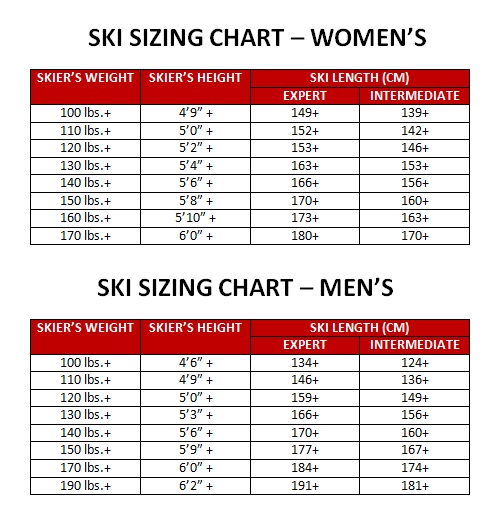Conquer the Slopes: The Ultimate Guide to Choosing the Right Ski Length
Carving down a pristine slope, feeling the wind in your hair and the thrill of the descent – skiing offers an unmatched experience. But before you hit the powder, a crucial decision awaits: selecting the right ski length. The perfect pair of skis can significantly impact your performance, comfort, and overall enjoyment. Choosing the wrong length can lead to frustration, difficulty controlling your skis, and even increase your risk of injury.
Determining the appropriate ski size isn’t a one-size-fits-all process. Several factors come into play, including your height, weight, skill level, and preferred skiing style. While traditional advice often revolves around a simple height-based chart, a more nuanced approach considers all these elements to ensure a truly personalized fit.
In the early days of skiing, skis were significantly longer than what we use today, often exceeding the skier's height. These longer skis were necessary for stability on less groomed slopes and with less advanced ski technology. As ski construction evolved with improved materials and designs, skis became progressively shorter, allowing for greater maneuverability and control. Today, the focus is on finding a ski length that balances stability and agility based on individual skier characteristics.
Understanding the importance of proper ski length is paramount for any skier. Correctly sized skis enhance your ability to initiate and control turns, maintain balance at higher speeds, and absorb vibrations from the snow. This translates to improved performance, increased confidence, and a more enjoyable skiing experience overall.
One of the main issues surrounding ski length selection is the oversimplification of the process. Relying solely on height can lead to an improper fit, especially for skiers who are heavier or lighter than average for their height, or for those with specific skiing preferences. For example, a beginner skier might benefit from slightly shorter skis for easier turning, while an advanced skier seeking high-speed stability might prefer longer skis.
Let's break down the factors affecting ski length: height, weight, skill level, and skiing style. Height provides a general starting point, but weight influences the pressure exerted on the skis, affecting their flex and responsiveness. Skill level plays a critical role, as beginners require more maneuverable skis, while advanced skiers may prefer longer, more stable skis. Finally, skiing style, whether it's carving groomers, venturing off-piste, or tackling moguls, dictates the ideal ski length for optimal performance.
As a simple example, imagine two skiers of the same height – one a lightweight beginner and the other a heavier, experienced skier. While their height suggests a similar ski length, the beginner would likely benefit from shorter skis for easier control, while the experienced skier might opt for slightly longer skis for greater stability at higher speeds.
Choosing the correct ski length offers numerous benefits. Firstly, it enhances control and maneuverability, allowing for smoother turns and greater precision on the slopes. Secondly, appropriately sized skis provide improved stability, especially at higher speeds, reducing the risk of catching an edge and falling. Lastly, correct ski length contributes to reduced fatigue, as you exert less effort to control your skis, allowing you to enjoy longer days on the mountain.
To find your ideal ski length, start by considering your height, weight, skill level, and preferred skiing style. Consult online ski length calculators, which often incorporate these factors to provide a recommended range. Visit a reputable ski shop and discuss your needs with a knowledgeable expert. They can help you fine-tune your selection based on your specific requirements and preferences.
Advantages and Disadvantages of Different Ski Lengths
| Ski Length | Advantages | Disadvantages |
|---|---|---|
| Shorter | Easier to turn, more maneuverable, better for beginners | Less stable at high speeds, can feel chattery on rough terrain |
| Longer | More stable at high speeds, better for advanced skiers, performs well in powder | More difficult to turn, requires more strength and skill |
Frequently Asked Questions:
1. What happens if my skis are too long? Too-long skis can be difficult to control and may increase your risk of falling.
2. What happens if my skis are too short? Too-short skis can feel unstable at higher speeds and may not provide enough float in powder.
3. Can I use the same skis for all types of skiing? Ideally, you should choose skis specific to your preferred skiing style.
4. Should I demo skis before buying? Demoing skis is highly recommended to find the perfect fit.
5. How often should I replace my skis? Skis should be replaced when they show signs of wear and tear or no longer perform optimally.
6. What role does ski width play? Ski width impacts floatation in powder and performance on different snow conditions.
7. Where can I find ski length calculators? Many online resources and ski manufacturer websites offer ski length calculators.
8. Do I need different ski lengths for different snow conditions? While not strictly necessary, specialized skis exist for different snow types.
Choosing the right ski length is crucial for maximizing your enjoyment and performance on the slopes. By considering your height, weight, skill level, and skiing style, and by seeking expert advice, you can find the perfect skis to unlock your full potential on the mountain. Don't let ill-fitting skis hold you back – invest the time and effort to find the right length and experience the thrill of skiing at its best. Consult with professionals, utilize online resources, and don't be afraid to ask questions. Your perfect ski length is out there waiting to be discovered.
Unleash your inner guardian anubis tattoos for men
Choi fu house choi ming court a deep dive
Corduroy pants women 80s fashion groovy threads or fashion faux pas














